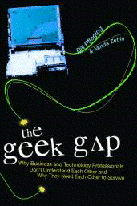Too Many Patents?
It's unusual for Apple, Microsoft, IBM and Google to all agree, but in the past few years, they've been unanimous in their opinion of the U.S. patent system: It's broken, they say. We spend too many billions defending nonsensical infringement claims. Time for reform!
Well, reform is coming in the form of the Patent Reform Act of 2007 which would dramatically (or not dramatically enough, depending who you ask) alter the way patents are managed in this country.
The Patent Office, everyone agrees, is completely overloaded. Patent applications take three to five years to even reach the review stage, examiners don't have enough time to check them out thoroughly and too many "junk patents" get through. Large companies argue that inventors pick up as many patents as they possibly can, not so as to use them (most patents are never used!) but in the hopes of winning the patent lottery by suing some larger company when it launches a product with technology or coding similar to one of their patents. Patent attorneys counter that any smart company needs to engage in patent stockpiling, since they're just as vulnerable to being sued as the big guys and "When they come knocking at your door, you want to come back with something other than a check," as Michelle Lee, head of patents at Google put it.
It's hard to figure out who the black hats and white hats are.
The biggest change in the new law would be to grant patents on the basis of first-to-file, as opposed to the current first-to-invent system. Inventors groups' rail against this change, saying it favors large companies with armies of patent lawyers who can get an application in quicker than the little guy can. The first-to-invent principle famously granted some very valuable patents--after a long legal battle--to a hapless graduate student who came up with laser technology but mistakenly thought he'd have to build a working laser before he could file for a patent on it.
On the other hand, the United States is the only nation on earth where first-to-invent predominates; everyone else uses first-to-file and there's no question that the change in law would dramatically simplify the patent process which currently involves a lot of investigation, because it's obviously much harder to determine who first created something than who was the first to get the paperwork through the door.
Meanwhile open source proponents like Eric Raymond think the reform doesn't go far enough to turn back the wave of junk patents that threaten the open-source community.
But of course, that's the philosophy of open-source: no patents, no copyrights, no ownership of anything. And that's the way they see the future.
As someone who makes her living creating copyrighted material, not to mention a class-action plaintiff in a lawsuit by writers against databases that put our material on the Internet, I find the concept of a world without ownership a little scary. But maybe the time has come for that. Maybe we need a whole new model for how we manage the ownership of ideas.
Well, reform is coming in the form of the Patent Reform Act of 2007 which would dramatically (or not dramatically enough, depending who you ask) alter the way patents are managed in this country.
The Patent Office, everyone agrees, is completely overloaded. Patent applications take three to five years to even reach the review stage, examiners don't have enough time to check them out thoroughly and too many "junk patents" get through. Large companies argue that inventors pick up as many patents as they possibly can, not so as to use them (most patents are never used!) but in the hopes of winning the patent lottery by suing some larger company when it launches a product with technology or coding similar to one of their patents. Patent attorneys counter that any smart company needs to engage in patent stockpiling, since they're just as vulnerable to being sued as the big guys and "When they come knocking at your door, you want to come back with something other than a check," as Michelle Lee, head of patents at Google put it.
It's hard to figure out who the black hats and white hats are.
The biggest change in the new law would be to grant patents on the basis of first-to-file, as opposed to the current first-to-invent system. Inventors groups' rail against this change, saying it favors large companies with armies of patent lawyers who can get an application in quicker than the little guy can. The first-to-invent principle famously granted some very valuable patents--after a long legal battle--to a hapless graduate student who came up with laser technology but mistakenly thought he'd have to build a working laser before he could file for a patent on it.
On the other hand, the United States is the only nation on earth where first-to-invent predominates; everyone else uses first-to-file and there's no question that the change in law would dramatically simplify the patent process which currently involves a lot of investigation, because it's obviously much harder to determine who first created something than who was the first to get the paperwork through the door.
Meanwhile open source proponents like Eric Raymond think the reform doesn't go far enough to turn back the wave of junk patents that threaten the open-source community.
But of course, that's the philosophy of open-source: no patents, no copyrights, no ownership of anything. And that's the way they see the future.
As someone who makes her living creating copyrighted material, not to mention a class-action plaintiff in a lawsuit by writers against databases that put our material on the Internet, I find the concept of a world without ownership a little scary. But maybe the time has come for that. Maybe we need a whole new model for how we manage the ownership of ideas.



0 Comments:
Post a Comment
Subscribe to Post Comments [Atom]
<< Home